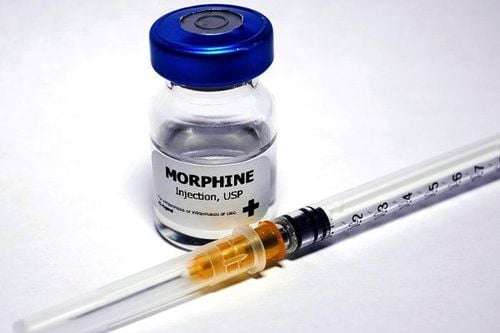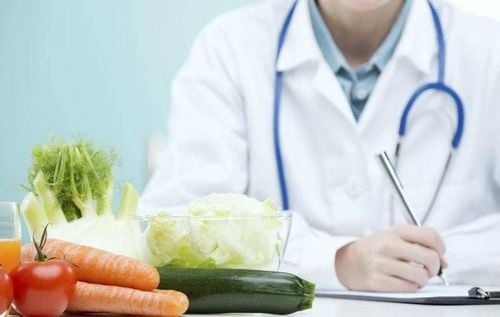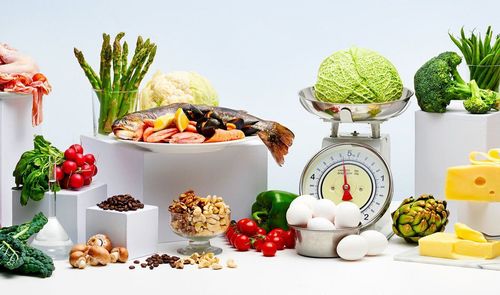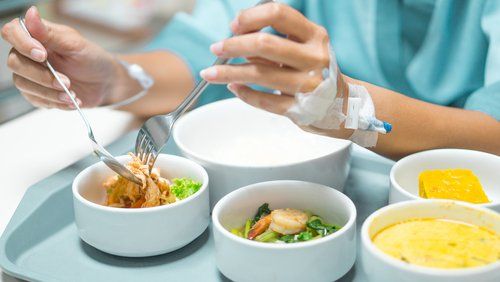This is an automatically translated article.
Most of the eating-related side effects of cancer treatments go away after treatment ends. However, there are still some side effects that may persist for a while after treatment. If this happens, talk to your healthcare provider to develop a plan to manage these problems, and your diet after cancer treatment is very important.1. Benefits of diet after cancer treatment
After you've finished your cancer treatment and the side effects have subsided, you'll likely be interested in food. This process will happen gradually. You need to try to be patient if you can't return to your normal eating habits, because, at this time, the body still needs a lot of time to recover. However, the question is: what to eat after cancer treatment? . For a short period of time, you need to try to eat well to:Give your body the energy it needs Help you feel better Keep your body healthy Help the sick person cope side effects of cancer treatment Furthermore, in the long run, eating well can:
Help you heal wounds and recover faster after treatment Reduce your risk of heart disease, diabetes type 2 and osteoporosis (weakening of bones) Reducing your risk factors for some other cancers Diet after cancer treatment is very important, and eating right can also help you feel in control. Take control of your own health. And now we know that people with cancer who are well nourished and able to maintain a healthy body weight live longer than people with the disease who have lost a lot of weight.
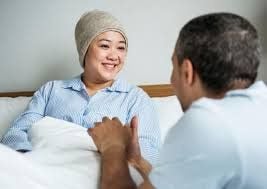
Hầu hết các tác dụng phụ liên quan đến ăn uống của các phương pháp điều trị ung thư sẽ biến mất sau khi điều trị kết thúc
2. What to eat after cancer treatment?
In general, for patients after cancer treatment, if they eat well, they can speed up the body's recovery process. Eating well means eating a variety of healthy foods like vegetables and fruits, whole grains, and protein.However, because everyone's nutritional needs are different, you may need help from a healthcare professional or a dietitian. They can help you figure out how to eat right and maintain a healthy body weight throughout your cancer experience. A dietitian can also help you if you're following a special diet, like vegan, vegetarian, or gluten-free, or if you need to limit or avoid certain foods because of a health condition such as: diabetes, heart disease, food allergies, or celiac disease. sick. A dietitian can help you make sure you're getting the calories, protein, and fluids you need to eat well.
Nutritional ingredients for patients after cancer treatment need attention:
2.1. Calorie intake During treatment, you may need more calories (energy) than usual in order not to lose weight. Potentially good food sources of calories include full-fat dairy products such as milk, yogurt, and cheese, and healthy fats such as: vegetable source oils, olives, avocados, nuts, and seeds. nut butter. However, after the treatment to make sure that they don't gain too much weight, they have to be careful with the calories they take in.
2.2. Protein Protein is good for the health of the body in many ways. It helps your body grow cells, heal tissues, and maintain a healthy immune system. And it can help the body avoid infection and recover more quickly. Good sources of protein include fish, poultry, lean red meat, eggs, nuts and nut butters, dried beans, peas and lentils, dairy products, and soy.
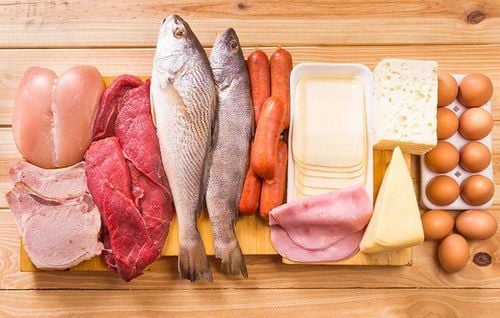
Protein giúp cơ thể bạn phát triển tế bào, chữa lành mô và duy trì hệ thống miễn dịch khỏe mạnh
Try to drink plenty of water and other liquids every day. When it's hot outside or you're active, you'll need to drink more. You will also need to take more if you have a fever, vomiting, or diarrhea. A dietitian can guide you to stay hydrated with your current condition.
2.4. Should vitamin and mineral supplements be taken? For people after cancer treatment should apply a balanced diet to be able to best supplement the source of vitamins and minerals. If that is ensured, the health status will be improved and enhanced. It's good to regularly take a multivitamin and mineral supplement according to your daily recommended needs, but check with your doctor before using these ingredients.
There is no evidence that taking more than the recommended amount of vitamins and minerals will improve your health or help prevent or cure cancer. In fact, taking too many vitamins or minerals can be harmful to your health, and even some vitamins or minerals can make cancer treatment less effective.
In addition, using foods that help strengthen the immune system is also a matter of concern for many people. There's no such thing as a perfect diet where any food or supplement can boost your immune system. The best thing you can do for your immune system is to follow an overall healthy lifestyle, which includes eating a healthy, balanced diet with a wide variety of foods.
There is no scientific evidence that any particular food or diet (e.g. alkaline diet, macrobiotic diet, or Gerson therapy diet) can cure cancer. Because these diets often limit food choices (such as meat, dairy, eggs, and even vegetables and fruits), even these meals may not provide the right amount of calories, protein, and vitamins. and minerals as recommended. At that time, it can lead to weight loss and poor nutrition affecting the patient's health.
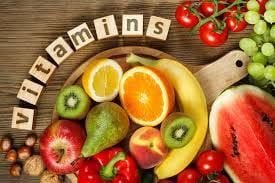
Đối với những người sau khi điều trị ung thư nên áp dụng chế độ ăn cân bằng để có thể bổ sung tốt nhất nguồn vitamin và chất khoáng
3. Tips for healthy eating after cancer treatment
As you start to feel better, you may have questions about eating healthier. Just as you want the best nutritional treatment your diet can give you, you'll also want to do the best for yourself at this critical time. Eating well will help you regain strength and energy, rebuild tissue, and feel better overall. Some tips for healthy eating after cancer treatment:Check with your healthcare provider to see if you have any food or dietary restrictions. Ask a dietitian to help you create a nutritious and balanced eating plan. Try to eat a variety of colorful fruits and vegetables every day; include citrus fruits and vegetables that are dark green and deep yellow. Eat plenty of fiber-rich foods, like wholegrain breads and cereals. Try to buy a different fruit, vegetable, low-fat food, or whole grain product every time you do your grocery shopping. Avoid or limit your intake of red meat (beef, pork, or lamb) and processed meats such as cured, smoked, and pickled foods (including bacon, hot dogs, and deli meats). Choose low-fat milk and dairy products. It is best not to drink alcohol. If you drink alcohol, limit the amount to no more than 1 drink per day for women and 2 drinks per day for men. Alcohol is a known carcinogen. If you are overweight, consider losing weight by cutting calories and increasing activity. Choose activities that you enjoy. Be sure to check with your healthcare provider before starting an exercise program.
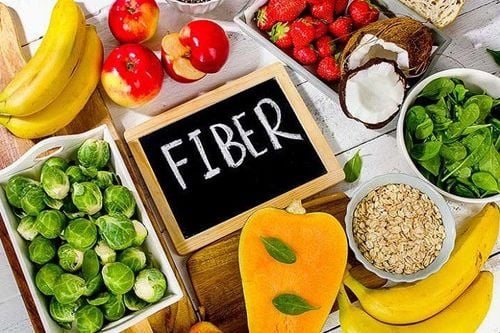
Sau điều trị ung thư, bạn nên sử dụng nhiều thực phẩm giàu chất xơ, như bánh mì và ngũ cốc nguyên hạt
Only one gene test can assess the risk of 16 common cancers in both men and women (lung cancer, colorectal cancer, breast cancer, pancreatic cancer, neck cancer) uterus, stomach cancer, prostate cancer,....) Early detection of early signs of cancer through imaging, endoscopy and ultrasound. The examination operation is simple, careful and accurate. A team of well-trained specialists, especially in oncology, is capable of handling cancer cases. With equipped facilities, advanced and modern medical equipment and a team of doctors with deep expertise and experience. At Vinmec, the examination process becomes quick with accurate results, saving costs and time for patients.
Please dial HOTLINE for more information or register for an appointment HERE. Download MyVinmec app to make appointments faster and to manage your bookings easily.
Reference source: cancer.org



